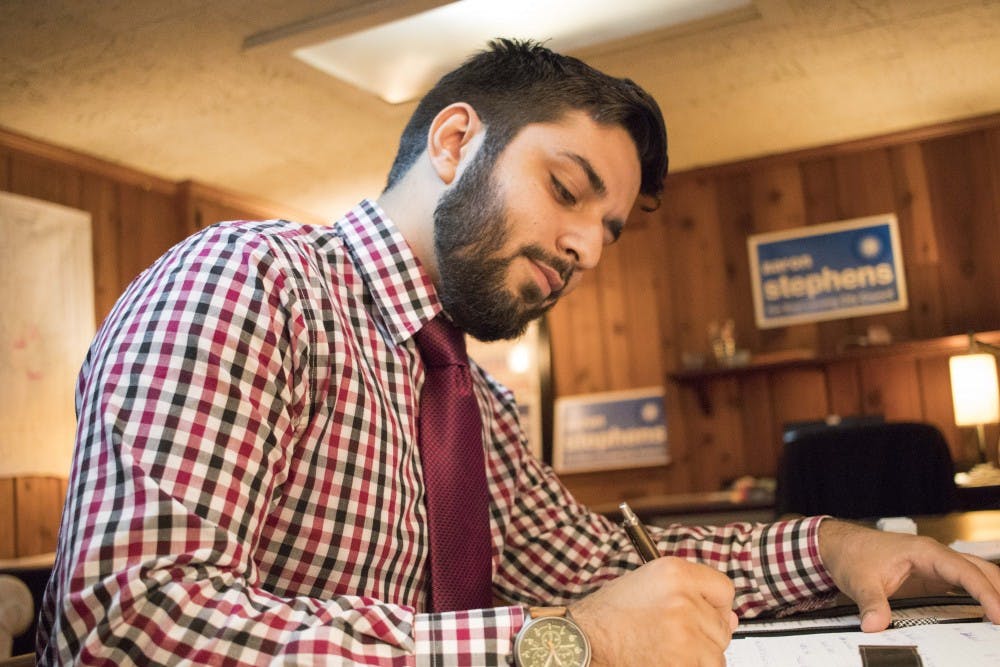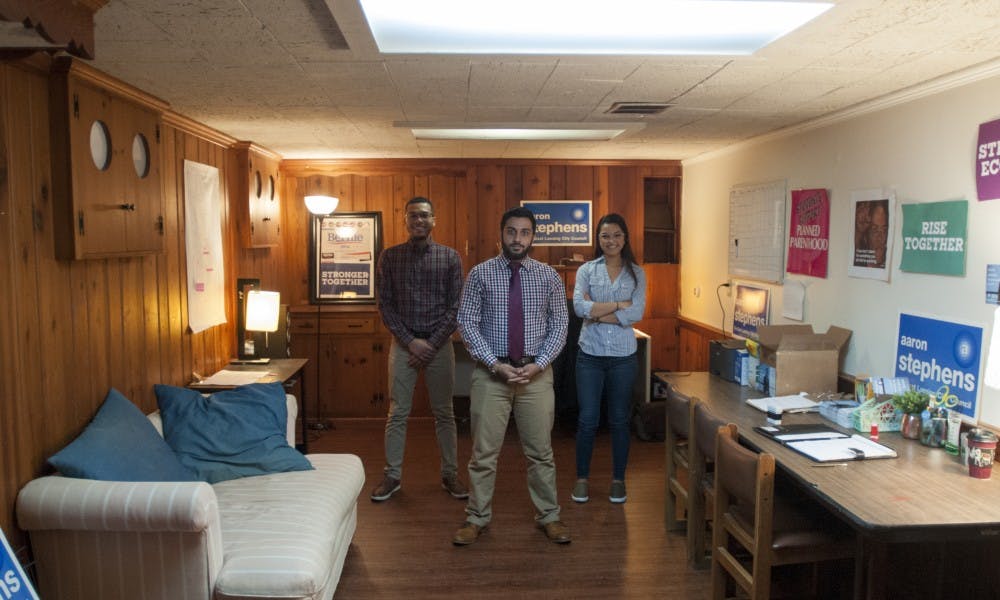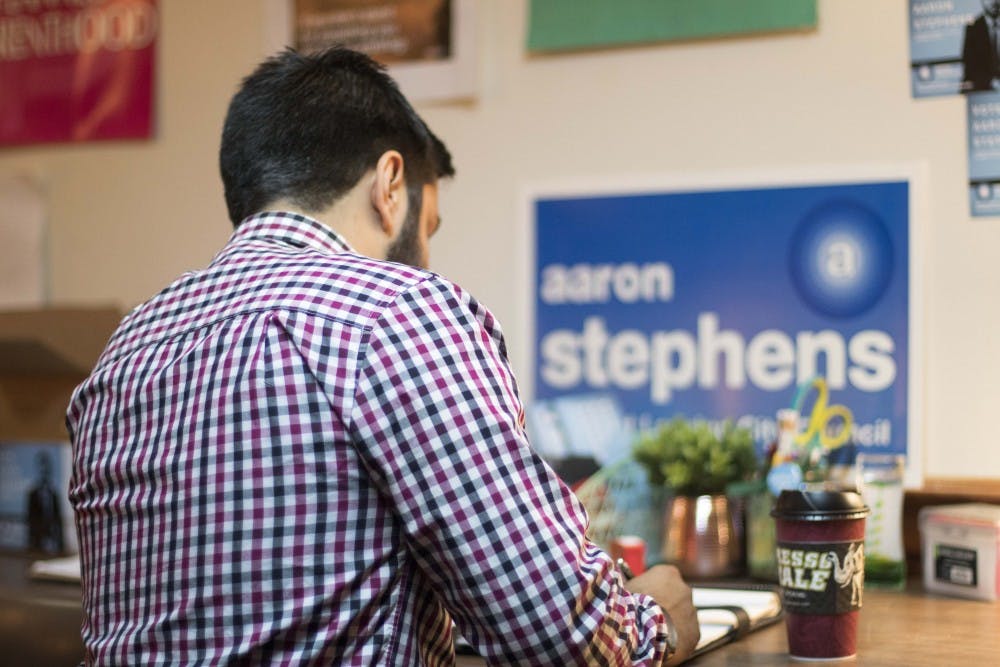“Political newcomer” seems to be an unfavorable description for Aaron Stephens, though it is appropriate in all technicality.
It’s what they label you the first time you run for public office even if your whole life has centered around politicking.

Aaron Stephens writes some notes on Sept. 13, at his house on Kedzie Street. Stephens is running for East Lansing City Council.
“Political newcomer” seems to be an unfavorable description for Aaron Stephens, though it is appropriate in all technicality.
It’s what they label you the first time you run for public office even if your whole life has centered around politicking.
Stephens, despite his immersion in all things politics, is still a political science pre-law senior running for a spot on East Lansing City Council.
The vantage point most of the voting public has, he’s a kid. Just 21 and fighting for a spot in one the state’s most politically active cities.
For unthinking minds and the incumbents sitting in a chummy position, it would seem easy to write him off.
The college kids, city residents like to say, don’t know enough.
They’re only temporary, they shouldn’t be weighing in on the issues.
One city official allegedly told him “he has no shot in hell” at capturing a seat, finishing the comment with a laugh and a smile.
But Stephens, determined to pull an upset, got an extra kick out of it.
An extra kick he probably didn’t need.
His bookshelves are lined with copies of political science books, neatly kept and well worn from what appears to be hours of meticulous attention to the contents.
Campaign signs from his time working for 2016 presidential candidate Hillary Clinton accent the shelves.
He brought Bernie Sanders, a democratic presidential primary candidate, to a packed Breslin Center. He poured hours into securing him — even sending his people to Vermont to coax Sanders to come.
He blurs the line between the blindness of youthful hope and cynicism of a well-weathered politician.
He’s seamless with words and his relation to strangers who open their doors to him is as fluid as if he’s sat on their porch for years.
He won an endorsement from Rep. Sam Singh (D-69th) who, at 24 years old, landed a spot on the East Lansing City Council and stayed there.
For 12 years.
Singh served as mayor, too, before joining Michigan’s House of Representatives where he is now the House minority leader.
Tom Perez, head of the Democratic National Committee, praised Stephens openly.
In the twilight hours before the most important health care legislation vote in recent memory, Stephens spoke at the steps of the Capitol in Washington, D.C., to more than a thousand people.
Support student media! Please consider donating to The State News and help fund the future of journalism.
And in a three person race for two seats, it might take a twilight push for him to capture one.
But perhaps not.
No chance in hell?
Place your bets.
The start
Aaron Stephens’ headquarters, the typical college rental house built decades before he was born, finds itself as the site of a potential flashpoint in East Lansing politics.
There were beds blocking the windows here not too long ago, shielding the police from seeing the parties thrown in it before Stephens and his campaign arrived.
It’s clean now. Beds removed. Light to pierces the walls.

It’s the same unabated light that Stephens is after, one that will pierce what he sees as a growing gap between the community and the university.
“Let’s put it this way, the city right now and the university have always been at odds,” Stephens told a young couple while campaigning. “And that’s a relationship I’ve never understood, really.”
It’s an odd relationship to try to crack.
East Lansing does not exist without MSU planting its roots in the area — the city was nearly named Collegeville and its first neighborhoods were plotted by an MSU professor.
But yet the city has formed its own independence, operating with nearly 50,000 permanent residents. And somewhere along that line where mutual dependence shrank, development charged ahead and independence became unavoidable, the relationship muddied.
It has reached the point of a very public and frank fight over an income tax the city charges it needs to address financial woes.
MSU says any income tax would disproportionately affect students and faculty.
And Stephens wants to fix it.
He’s running on three main platforms: addressing the city’s economic and development future, pushing the city to 100 percent renewable energy and bridging the gap between the university, police and businesses.
But first, the small steps.
It's July 16 and gathered in the tiny living room of Stephens’ campaign home is a band of campaign associates and friends not much younger or older than Stephens himself.
They’re friends with a strong belief in Stephens and his ideals.
They aren’t political operatives — not many are versed in politics. But it’s what he has.
He runs them through a formal training, what to expect, what to hammer home when a door opens.
And he’ll be joining them too, traversing nearly every East Lansing neighborhood to get his name out there.
“I have a rule that nobody that works for me ever will do anything that I won’t do myself,” Stephens said. “I hate that, that original internship aspect where you go get coffee, that’s not going to make anybody learn.”
And he’ll do it, nearly every day for the rest of the summer.
Stephens walks up Kedzie Street, a stack of campaign fliers in one hand and a tablet, loaded with voter data, in the other.
The literature fresh out of boxes for the kickoff of Stephens campaign is what he’s concerned with today.
It’s the calling card, his first impression to a contingent of voters who barely know who he is.
“Even if they throw out my literature just like immediately after, they’ll still see my name,” Stephens jokes as he approaches the first houses on his list.
The first few houses no one answers.
But as the day continues, the first one to answer is a woman named Paula.
“I’m running for East Lansing City Council and I actually just wanted to stop by give you some literature and maybe ask you a couple questions if you have the minute,” Stephens says.
She answers warmly, intrigued by him.
“So what do you want to see out of your city?” Stephens asks.
And he’ll do this countless times, at every door that opens up to him, because it matters to him.
Some of those he meets will launch into a political diatribe, others will mention something as small as tree cutting or as large as taxes.
Some will question him back but he never appears fazed.
“Everybody is talking about development, everybody is talking about the income tax, this woman is just like, ‘You know I want my kids to have shade when they play in the park,” Stephens says. “That’s what is important about knocking doors.”
Most will mention his student status but none seem to ponder it. At least not for long.
“We were expecting a lot of backlash,” Stephens said on the topic. “But truthfully, I think people are very happy that a younger person is trying to get involved.”
Against the odds
“I’m sort of surprised that he’s running since he’s still enrolled as a student,” East Lansing City Councilmember Susan Woods said in an interview with The State News. “That’s a lot of commitment if he was elected but we are open to anybody who can run so I think it will be interesting.”
Woods has served on council for the last four years and is one of two incumbents Stephens is up against, Mayor Pro Tem Ruth Beier being the other.
“Incumbents have an almost an enormous advantage,” Woods said. “We’re recognized names, both Ruth and I have worked there for four years.”
Stephens’ youth may seem like a detriment. His campaign may even seem like just another ill-fated run by a young person, started with the best of intentions but destined to die before the election even gets advertised.
But the more the doors opened up, the more it seemed Stephens was no longer lurking in the shadows.
A heightened confidence began to emerge over the last two months.
“What’s interesting about city council elections is so few people vote that anything can happen,” Beier said. “If only 2,000 people vote, anybody can win. So, I don’t think of it as a forgone conclusion at all.”
Both Beier and Woods pointed to the student aspect, mentioning that student voter turnout is low, especially in council elections.
If Stephens is relying on the student vote, he is sure to lose, they argue.
“This is just total surmise, I haven't spoken to him about it but I think he just wants to have a platform to talk about certain things,” Woods said. “He’s involved in sort of political campaigns, political life so this just one way to extend that.”
Neither Beier nor Woods were really sure what Stephens’ positions were.
But while neither may be particularly concerned with Stephens, a prominent former councilmember saw something in him enough to endorse him.
It’s Sept. 5 and Stephens stands behind the pool table he and his housemates recently put in.
It’s two months and two days until election.
“Sam Singh endorsed me,” Stephens says with a smile.
It’s no small thing for a prominent state and local politician to endorse him. The endorsement had been in the works for weeks and was made official on Sept. 12.
“I met Aaron two years ago during the beginning of his college career, and got the opportunity to work with him during Hillary Clinton’s campaign for president,” Singh said in a press release. “He is a bright, fresh voice and after hearing his plan for our city, I am proud to endorse him for East Lansing City Council.”
Singh’s endorsement injects a level a legitimacy into Stephens’ campaign bid even if Stephens were to lose.
The endorsement sets him up for future runs. Stephens won’t be want for anything.
For now, Singh becomes a plentiful resource of knowledge on East Lansing.
“His perspective is going to be vital in doing absolutely everything that I want to do for this city and making it a better place,” Stephens said. “He devoted a good amount of his life to doing the exact same thing. To have his support and to have his overall presence be a part of my overall campaign is very meaningful.”
Just maybe
It's August now and Stephens has been to hundreds of doors but there is a particular door this day which sticks.
An older woman is tending to her landscaping, an intertwined mix of flowers and shrubbery.

As Stephens hands her his literature she makes the point of noting she voted for President Donald Trump.
“I voted for him because he said things I’ve always wanted to say but never saw a politician doing it,” she says.
She notes Stephens’ former employment with Bernie Sanders.
But the two hit it off, perhaps more than at any other door.
They discuss California, crack jokes about marriage amid bouncing around about national policy issues.
“National politics aside, I think that we would agree on a lot of city issues,” Stephens says, which launches a discussion on city financial woes.
There’s a smoothness to the way Stephens meshes with the potential voters almost as if it's been ingrained in him, finally manifesting itself as he tries to secure his biggest victory up to this point.
His goals are there in front of him, begging to be captured, but he’s stuck in a waiting game.
If past is precedent, city council election turnout will be slim and no more than 200 students will vote.
Perhaps he’s playing a game he cannot win, a game which could tease him to the bitter end.
But the fighters in politics know and have always known, one election, one campaign does not make a career.
“My entire life is going to be devoted to trying to fight for the things I believe in and just fighting for people who might not be able to fight for themselves,” Stephens said.
No chance in hell?
Only hell knows.